The Book of Disquiet (Penguin Classics)
 I have spent a year and a half trying to get through this book. I actually felt relief when my Kindle got broken so I couldn't read more. I don't know what it is, but I just cannot get through Pessoa's work, even though I feel like I should like it very much, and be very impressed, and feel like a different person after reading it. I just don't.
I have spent a year and a half trying to get through this book. I actually felt relief when my Kindle got broken so I couldn't read more. I don't know what it is, but I just cannot get through Pessoa's work, even though I feel like I should like it very much, and be very impressed, and feel like a different person after reading it. I just don't. I ground my way through half of it, and some of it were good, some of it resonated strongly with it - but most of it was just ... boring. There, I said it. This is me giving you up, Pessoa. For now, you will stay unread at the bottom of my Kindle library.
 1
1
The Idiot (Penguin Classics)
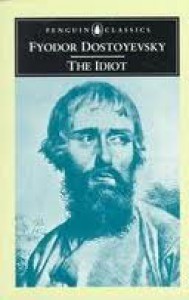 I've had this book for five years, since 2008, and finishing it was extremely satisfying. The three stars is for my enjoyment of it (quite good, but not a book I will read again), and not for the quality of the literature. It is unmistakably a well written and thought provoking book. I think I might have had my fill of Dostoyevsky for the time being though...
I've had this book for five years, since 2008, and finishing it was extremely satisfying. The three stars is for my enjoyment of it (quite good, but not a book I will read again), and not for the quality of the literature. It is unmistakably a well written and thought provoking book. I think I might have had my fill of Dostoyevsky for the time being though...
The Count of Monte Cristo
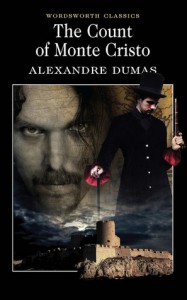 A fantastic book, which I wouldn't even know how to begin to review properly. I will just say this; the Wordsworth Classics-edition, with its endnotes by Keith Wren, heightens the experience of the book simply for the hilarity that is Wren and his at times frustrated irritability with the translator. At one point he deliciously calls the translator "all at sea" in the silliness of his word choices. Loved it. I was almost as sad to see the notes end as to see the book itself end. It was a journey of pure epic proportions.
A fantastic book, which I wouldn't even know how to begin to review properly. I will just say this; the Wordsworth Classics-edition, with its endnotes by Keith Wren, heightens the experience of the book simply for the hilarity that is Wren and his at times frustrated irritability with the translator. At one point he deliciously calls the translator "all at sea" in the silliness of his word choices. Loved it. I was almost as sad to see the notes end as to see the book itself end. It was a journey of pure epic proportions.
Who Goes There
 Too many adverbs and stilted dialogue made what would otherwise have been a very enjoyable collection of short stories into something that felt like a chore to read. Campbell explains things to death. The last story I was ready to give up after the hundreth repetition of "cold and dead". It was exhausting. And the infodumps! Dear lord! I read science fiction partly to be intrigued, mystified, and to explore the unknown. I do not need nor want infodumps - I like to find my bearing and understanding of what is going on at a slow pace, while the story unfolds naturally. Campbell explains everything at once, killing what could be an interesting mystery right off the bat.
Too many adverbs and stilted dialogue made what would otherwise have been a very enjoyable collection of short stories into something that felt like a chore to read. Campbell explains things to death. The last story I was ready to give up after the hundreth repetition of "cold and dead". It was exhausting. And the infodumps! Dear lord! I read science fiction partly to be intrigued, mystified, and to explore the unknown. I do not need nor want infodumps - I like to find my bearing and understanding of what is going on at a slow pace, while the story unfolds naturally. Campbell explains everything at once, killing what could be an interesting mystery right off the bat. His ideas are good, the execution of those ideas is lacking.
Daughter of Elysium
 Maybe it's because this is a semi-sequel, and I haven't read the book that precedes this, but I just couldn't get into the novel. I slugged through 200 pages, and realised that I had almost no clue who anyone were, or what they were doing, because I couldn't pay attention while reading. I might try reading the first book, and then this one, at a later point. Right now I'll mark it as unfinished.
Maybe it's because this is a semi-sequel, and I haven't read the book that precedes this, but I just couldn't get into the novel. I slugged through 200 pages, and realised that I had almost no clue who anyone were, or what they were doing, because I couldn't pay attention while reading. I might try reading the first book, and then this one, at a later point. Right now I'll mark it as unfinished.
The Cambridge Companion to Science Fiction (Cambridge Companions to Literature)
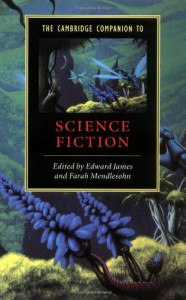 Read to make myself more aware of what has been going on and is happening in the SF field, and how I can contribute to it through my own writing. Skipped parts not partiularily relevant to me at this point (such as the chapter on religion), but a consise and very interesting read, which gave me a long list of new books I wish to read. Especially happy about all the female authors discussed, as I've had trouble finding SF written by women.
Read to make myself more aware of what has been going on and is happening in the SF field, and how I can contribute to it through my own writing. Skipped parts not partiularily relevant to me at this point (such as the chapter on religion), but a consise and very interesting read, which gave me a long list of new books I wish to read. Especially happy about all the female authors discussed, as I've had trouble finding SF written by women.
The Captain's Verses (Los versos del capitan) (English and Spanish Edition)
 2.5 stars.
2.5 stars.Having read a collection of Neruda's odes in Norwegian, which I absolutely loved, I was so happy that I found a Kindle-version of this book tonight, when I had such a craving for some really good poetry.
And then I was disappointed. And I'm disappointed that I was disapppointed! I chose Neruda because I was absolutely certain I would love it from beginning to end - and all the positive reviews made me all the more stoked.
As it was, all the respons this collection inspired in me, was a lukewarm "meh". The language and imagery was nothing like as beautiful as that which was found in his odes (might be a problem of translation? maybe Neruda works better in Norwegian than in English?), and about halfway through I was beginning to feel the collection repetitious and to be quite frank - a little boring.
The poetry also focused almost entirely on the bodily. The second part of the collection is called "Lust" (or something like that), but imho, the whole collection could be called Lust. Because that's all there is. At one point, when I had read about the wheat-colored skin, bronze hair and soft breasts of the female whom the poems are written for/about, for what felt like the eleventhy time, I felt like screaming. I had to go do something else.
Then, in a fit of introspection, the I of the poems says that, ah, maybe the reader wonders if the body is all there is! And I thought finallyyyy I will have some lines about something besides kissing and wheat and breasts.
Nope. More lines about kissing and wheat and breasts. With some fruit and soul thrown in as well.
Oh well. Still haven't lost faith in Neruda as a poet, but I'll stick to the odes, for now.
The Island Of Doctor Moreau
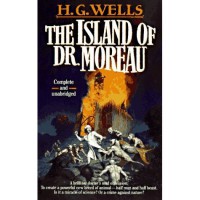 This was quite a bit more disturbing and disgusting than I had thought it would be from the start. The descriptions of the Beast Men and the torturous vivisections made by Doctor Moreau was really awful to read.
This was quite a bit more disturbing and disgusting than I had thought it would be from the start. The descriptions of the Beast Men and the torturous vivisections made by Doctor Moreau was really awful to read. Liked the book as a whole, though not as much as other books of Wells', because I'm a bit weary of Robinsonades, having read way too many of them by now, and rarely finding them very interesting.
Poet To Poet Prufrock And Other Observations
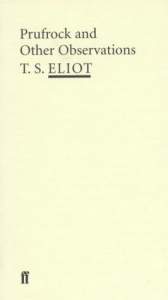 In reality 4.5 stars.
In reality 4.5 stars. The title poem gets a full five stars, undoubtedly. It was a poem I thought I wouldn't like (heaven knows why), and I read it almost by accident (the beginning is quoted in a John Green novel). I read it three times in a row, every time more blown away than the last.
The other poem I absolutely loved in this small collection was "Rhapsody on a Windy Night". The last two lines made me draw my breath sharply and almost start crying. I was so shudderingly stricken by the ending that I had to read the last stanza several times before I could move on.
The reason the collection would "lose" half a star had that been possible, is because several of the short poems didn't do much of anything for me. I'll definitely read the collection several times though, so maybe I'll develop a stronger liking of them in the future.
Also, as a sidenote - I love that I could read this for free on my Kindle through the Gutenberg Project. I urge anyone and everyone who loves poetry to go there immediatly, whether you have a Kindle or not, and read the collection. Beautiful poetry for free? We live in a wonderful world.
HEKT
 Til min gledelige overraskelse var HEKT helt annerledes enn den forrige diktsamlingen til Vold, og mye, mye bedre. Denne ville fått fire og en halv stjerne, hadde halvstjerner vært mulige å gi. Diktene var interessante, spennende og emosjonelle, og flere steder måtte jeg stanse opp og markere linjer og fraser jeg syntes tok ting så uhyre på kornet at jeg følte jeg måtte huske dem. Diktet som beskriver hvordan en skrur i skruer var favoritten min i denne samlingen. Herlig.
Til min gledelige overraskelse var HEKT helt annerledes enn den forrige diktsamlingen til Vold, og mye, mye bedre. Denne ville fått fire og en halv stjerne, hadde halvstjerner vært mulige å gi. Diktene var interessante, spennende og emosjonelle, og flere steder måtte jeg stanse opp og markere linjer og fraser jeg syntes tok ting så uhyre på kornet at jeg følte jeg måtte huske dem. Diktet som beskriver hvordan en skrur i skruer var favoritten min i denne samlingen. Herlig.
blikket
 Så overrasket jeg ble over hvor mye jeg likte mellom speil og speil av Vold, er den samme overraskelsen over hvor dårlig jeg likte blikket. Det er system- og konkretpoesi, der ordene "blikket du fanger ikke meg" gjentas i ulike former og sammensetninger systematisk inntil alle kombinasjoner er oppbrukt.
Så overrasket jeg ble over hvor mye jeg likte mellom speil og speil av Vold, er den samme overraskelsen over hvor dårlig jeg likte blikket. Det er system- og konkretpoesi, der ordene "blikket du fanger ikke meg" gjentas i ulike former og sammensetninger systematisk inntil alle kombinasjoner er oppbrukt.Jeg har prøvd å forstå og like denne type poesi. Det fungerer ikke. Det blir dørgende kjedelig for meg.
Det eneste som var litt interessant var hvor distraherende det var å komme over grammatisk korrekte fraser innimellom alle de ugrammatiske frasene som det var side opp og side ned av. Og jeg antar at dette med blikk og lesing og hvor fremmed ordene etterhvert ble (jeg slett med å huske hva "fanger" betydde til slutt) er et av poengene her. Jeg kan også se at det ville hatt en viss effekt på 60-tallet - avantgarde kunst osv - og at det også er noe av grunnen til at slik poesi eksisterer.
Jeg likte det likevel ikke. Dessverre. Jeg håper den neste diktsamlingen, HEKT, er bedre...
mellom speil og speil
 Jeg har lest en del Vold før, men som regel i form av enkelte dikt her og der. Å lese debutsamlingen hans var en interessant opplevelse, og jeg hadde ærlig talt mer sansen for disse diktene enn diktene i for eksempel Tolv meditasjoner. Disse føltes mer tilgjengelige, og hadde mer følelse enn jeg har opplevd i Volds poesi tidligere (bortsett fra "Tale for loffen", som er etter min mening en av Norges aller beste dikt...).
Jeg har lest en del Vold før, men som regel i form av enkelte dikt her og der. Å lese debutsamlingen hans var en interessant opplevelse, og jeg hadde ærlig talt mer sansen for disse diktene enn diktene i for eksempel Tolv meditasjoner. Disse føltes mer tilgjengelige, og hadde mer følelse enn jeg har opplevd i Volds poesi tidligere (bortsett fra "Tale for loffen", som er etter min mening en av Norges aller beste dikt...).Det var også artig å lese figurpoesi, som er svært sjelden i moderne dikt, og som sjelden gjøres bra. Vold fikk det faktisk til å fungere, og jeg er imponert.
Gleder meg nå til å lese de to andre diktsamlingene av ham jeg har liggende.
Ta i mot
 Starten på diktsamlingen var for min del den svakeste, der diktene ikke greide fange meg helt. Fra og med seksjonen som heter "Inn" derimot, leste jeg i rasende fart. Hukes bruk av fragmenter fra samtaler og bøker gir samlingen flere lag og et helt eget særpreg. Det var en diktsamling som ga meg lyst til å skrive dikt - hvilket må være noe av det beste en diktsamling kan gjøre.
Starten på diktsamlingen var for min del den svakeste, der diktene ikke greide fange meg helt. Fra og med seksjonen som heter "Inn" derimot, leste jeg i rasende fart. Hukes bruk av fragmenter fra samtaler og bøker gir samlingen flere lag og et helt eget særpreg. Det var en diktsamling som ga meg lyst til å skrive dikt - hvilket må være noe av det beste en diktsamling kan gjøre.
Speilet i speilet - en labyrint
 A book I found impossible to finish. While I love Ende's children's books, Neverending Story being one of my all time favourites, this one did not sit well with me.
A book I found impossible to finish. While I love Ende's children's books, Neverending Story being one of my all time favourites, this one did not sit well with me. Maybe it was the contrast between the surrealism in these stories and the magic in his children's stories that caused a dissonance in my head, and thus I could not enjoy the work; maybe surrealist fiction isn't for me; maybe the sotries were just badly written. Whatever the reason, I did not enjoy reading this book. One story I liked, but out of tens of stories, that's not enough.
I've read surrealist fiction before, and some of it I've liked, some of it I haven't. This I didn't like. I'm not sure why, and I'm not able to examine why either, because I started this book in January 2010, and have hardly touched it in a year and a half. It bothers me. I read half, and I'm not going to spend more time trying to slug through the rest, even if it is Ende.
Complete Poems
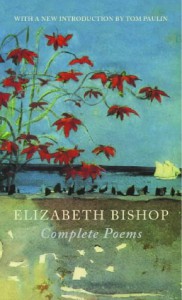 Elizabeth Bishop's poetry is beautiful, and though I'm not a fan of works collected in one book like this, I'm glad I have read all of her work now. Her actual collections of work (North and South, A Cold Spring etc) whetted my appetite for more, and I thought it would be interesting to read the entire body of her work. The adult poetry is of course far superior to her adolescent poetry, but it was interesting to see the contrast, and how she grew and developed a voice over the years.
Elizabeth Bishop's poetry is beautiful, and though I'm not a fan of works collected in one book like this, I'm glad I have read all of her work now. Her actual collections of work (North and South, A Cold Spring etc) whetted my appetite for more, and I thought it would be interesting to read the entire body of her work. The adult poetry is of course far superior to her adolescent poetry, but it was interesting to see the contrast, and how she grew and developed a voice over the years. I was slightly puzzled by the inclusion of other people's poetry that she had translated, but the translations seem good, and the poems were nice, so no matter.
A collection I no doubt will come back to often, to reread my favourite poems.



